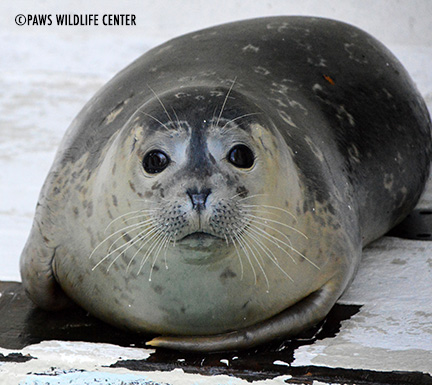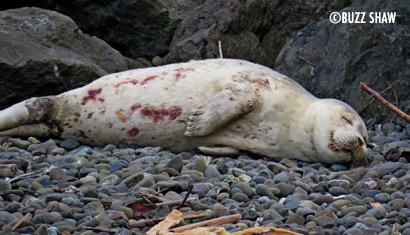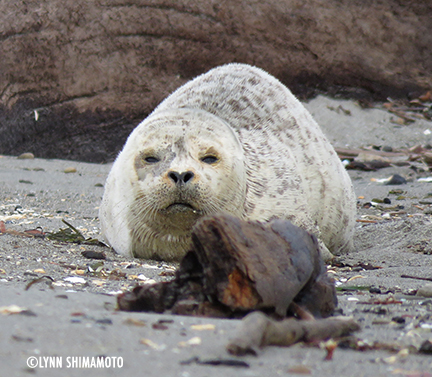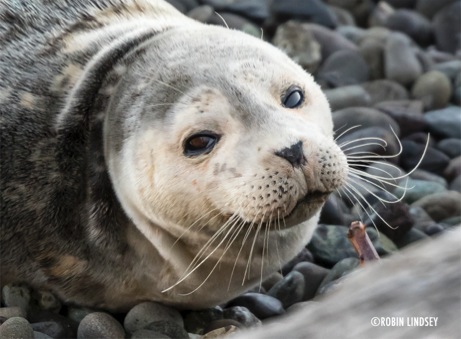Feb 2017
Seal pup Hope thriving in rehab for return to the wild
Feb/19/17 06:17 PM

A very chubby Hope, markedly more robust than when captured, is shown at right, resting poolside at PAWS Wildlife Center.
Upon capture by first responders, the small female was covered in bite wounds - 22 in all - from an unknown animal (see photo below). Thankfully, the punctures were not deep and infected.

Hope was soon moved to her very own outdoor pool, gradually packing on weight and a thick layer of blubber which will keep her warm and sustain her while she adapts to life back in the wild.
Rough winter for West Seattle seal pups as another succumbs
Feb/12/17 08:23 AM

A pup had been reported in the same location two evenings earlier, but was gone when First Responder David arrived minutes after the call. Late that night, the pup came back ashore; however, the beach was empty once again at 6am. Later that afternoon, the hotline received another call. First Responder Melinda made her way to the beach in very slushy conditions after a winter storm hit Seattle and nicknamed the pup Slushpuppy. With the help of volunteers, she taped off access to the area around the small, alert seal. After about an hour, blood was seen drooling from the pup’s face, but shortly thereafter a surprisingly nimble Slushpuppy scooted over a log, across the sand and disappeared into the gray waves.
Photographs revealed significant bloody discharge and plans were set into motion to capture the pup if sighted again. Early Wednesday, a beachcomber called Seal Sitters’ hotline to report Slushpuppy resting near the high tide line a little further down the beach. First Responders Robin and Lynn captured her and made the drive to PAWS. Sadly, Slushpuppy died overnight with severe breathing issues.
A necropsy by WDFW Marine Mammal Investigations revealed that the thin female’s lungs were a “total mess”. Along with multiple small abscesses and ruptures, there was a huge amount of clotted bloody mucous in the trachea and lungs. Lungworm infestation and migration was causing the clotting issues. Parasitic infestation and resulting complications, including pneumonia, is a common and often deadly issue for pups, who struggle with low body weight after weaning. Suppressed immune systems, further compromised by long, wet winters, allow parasites to take hold and wreak havoc on lungs and hearts.
Please, do give seal pups space on the beach to rest and warm up undisturbed - it is truly a matter of life and death.
Bittersweet news about West Seattle seal pups in rehab
Feb/06/17 01:19 PM

We’re elated to report that female seal pup Hope (shown at left, before capture near the Water Taxi landing) is gaining weight and doing pretty well overall.
Hope’s body was riddled with over 20 bite wounds, from an unidentified animal. Barring any unforeseen health issues, she may be released back to the wild waters of Puget Sound in a couple of weeks. That is great news about her new lease on life!
On a very sad note, Wild Thing, the thin male pup rescued by Seal Sitters first responders near Lincoln Park’s Colman Pool on January 21st, took a turn for the worse and died ten days later. In addition to two infected “animal bites” on the chest, Wild Thing’s “guardedly cautious” chance for recovery was compromised by a number of issues. WDFW Marine Mammal Investigations Unit will be performing a necropsy and we will update you with their findings.
NECROPSY FINDINGS
A necropsy by WDFW Marine Mammal Investigations revealed that Wild Thing most likely died from a systemic bacterial infection from a chest wound. Additionally, the pup had a drastically thin blubber layer.







